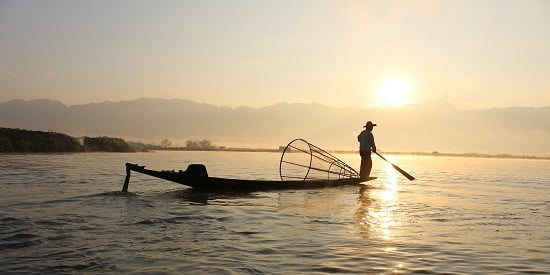Deakin research teams in Myanmar uncover cooperation amid conflict
Media releaseNew Deakin research shows surprising links of ethnic co-operation and social connections in Myanmar's strife-torn Rakhine state, which has seen more than 646,000 Rohingya Muslims flee to Bangladesh over the past four months.
Deakin researchers Dr Anthony Ware and Dr Costas Laoutides made the observations during recent study trips to Rakhine, where they found a small but determined push for peace which they hope could kick-start social change and lead to stability on the country's western coast.
Dr Ware, who is a Senior Lecturer in International and Community Development, said members of local civil society consortiums in Rakhine were committed to bridging ethnic divides and rebuilding broken community linkages, ensuring local aid reached affected Muslim and Buddhist communities equally.
In areas with mixed populations that had not been affected by the recent violence, he also found villagers willing to reach out to try to build peaceful relations.
"These people are telling us they want to make a difference and turn the situation around," Dr Ware said.
"They are very brave. They're taking big risks, and it's inspirational to see."
Dr Ware's comments came as Deakin researchers headed back into Rakhine state to restart a ground-breaking study seeking villagers' input about potential paths to peace and community development.
Deakin research teams collected detailed data from 130 villages before violence in August forced a temporary halt to their work, and will now visit 40 remaining villages over December and January - including 10 villages with Muslim, Buddhist and Hindu populations near the heart of the conflict zone.
Dr Ware and Dr Laoutides, both from the School of Humanities and Social Sciences, are carrying out the "bottom-up" analysis with a Myanmar-based local partner organisation, supported by the Gerda Henkel Foundation.
Their preliminary findings revealed economic connections between Rohingya Muslims and Buddhist villagers had continued despite the conflict and rising tensions, which UN High Commissioner for Human Rights Zeid Ra'ad al-Hussein has described as appearing to be "a textbook example of ethnic cleansing".
"The villagers are working together in rice paddies and hiring one another’s equipment - they're not necessarily best friends but they're still relying on each other when it comes to the economy and trade," Dr Ware said.
"At the moment the biggest hope is that economic cooperation and social entanglement is still holding in areas less affected by the recent violence."
Dr Ware said he had been amazed to find residents in several Buddhist villages were prepared to use the term "Rohingya" when referring to Rakhine's Muslim population, despite it being at odds with the government's decision to ignore the name.
"This is huge, and shows a degree of understanding and willingness to accept others that we were not expecting," Dr Ware said.
There are now about 646,000 Rohingya in Bangladeshi refugee camps, and Dr Ware said he feared the refugees would not be safe to return until Myanmar's government and military addressed issues of discrimination within the nation's political system.
"This is about more than just getting these people back across the border to their homes - there are really deep underlying fears and issues here that need addressing, on all sides," Dr Ware said.
"International attention is hoping for a quick fix. The reality is, even if security is guaranteed and the refugees return to Myanmar, there is no quick fix. It's going to need deep social change and really difficult solutions."
But Dr Ware said he was hopeful that the recent discovery of civil society and village efforts to build peace might be the start of something much deeper.
In a second but related project, he and colleague Dr Vicki-Ann Ware worked with development organisation GraceWorks Myanmar to design and lead peace-building activities for community development facilitators working in rural villages.
Dr Vicki-Ann Ware led the latest training sessions in Rakhine earlier this month, using an arts-based approach to peace building through music, song writing and poetry.
The sessions, which were attended by about 30 community leaders from within the state, allowed participants to process their thoughts on the ongoing Rakhine conflict.
"By the end of the three-day training sessions, the degree of people not just wanting peace, but wanting actual peace-building to get to peace was astounding," Dr Anthony Ware said.
"Social change has to start somewhere and maybe this is the spark that's needed - it's small scale, but with the recent fire of violence, perhaps this spark can be the start of the process."

